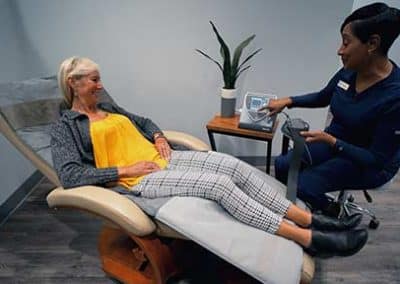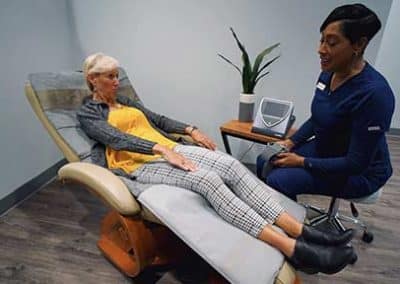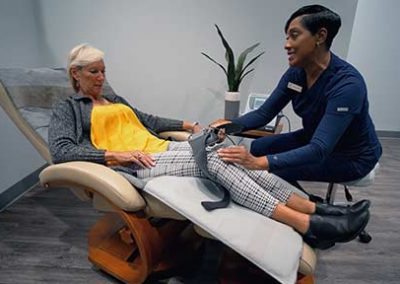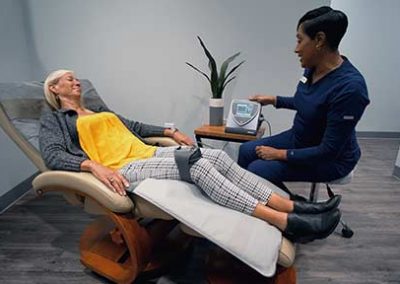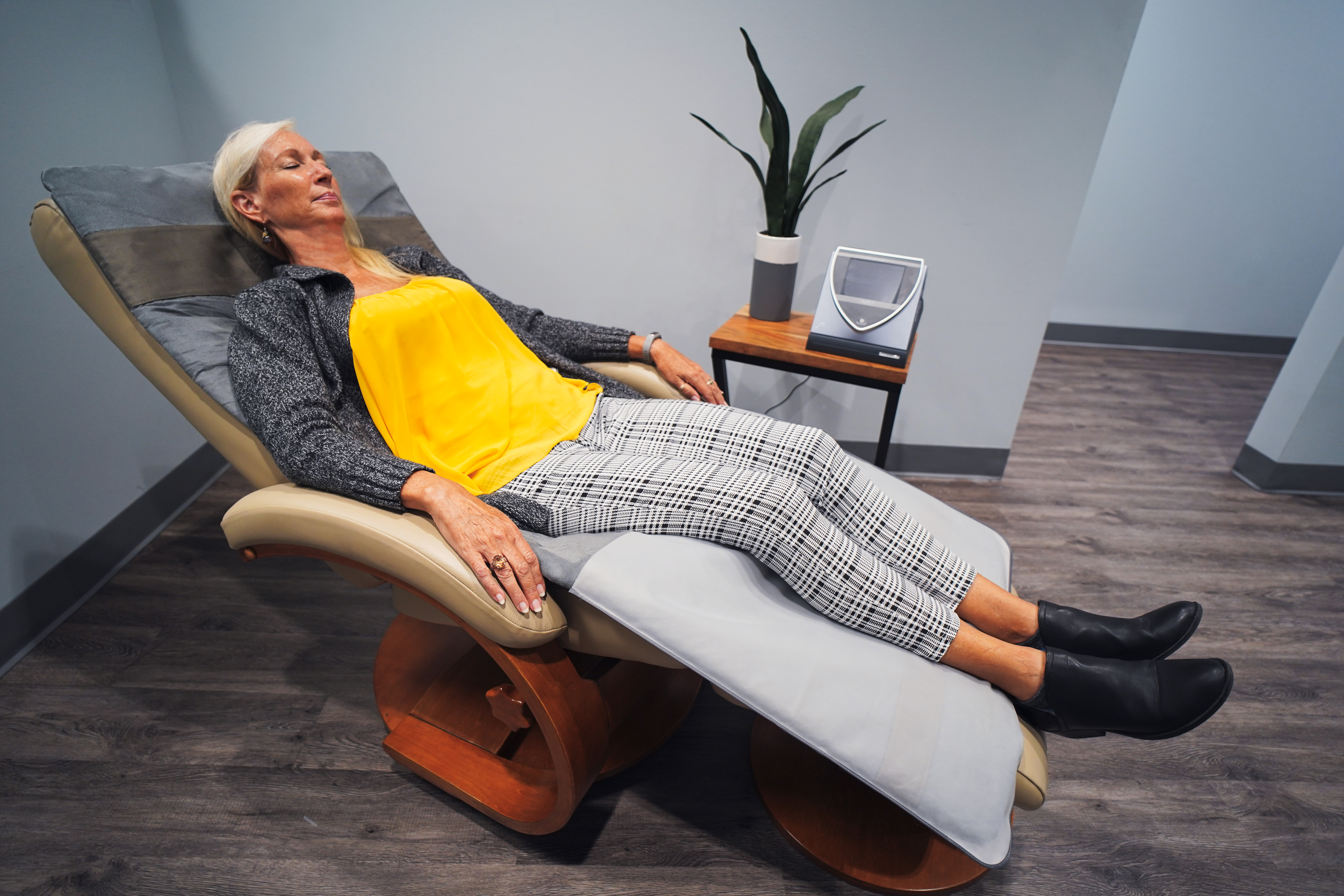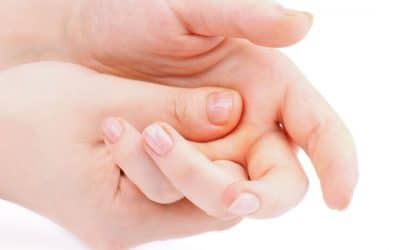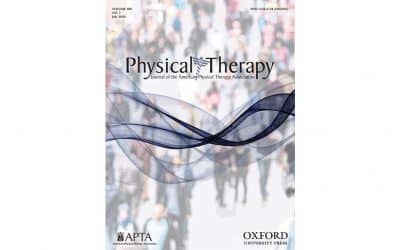Pulsed Electromagnetic Field Therapy
Pulsed electromagnetic field (PEMF) therapy has been used in healing for decades. The specific PEMF frequency initiates vasomotion which increases blood flow in your smaller arteries, facilitates blood flow in your tissues, and supplies oxygen to tissue regions that were receiving little to no oxygen(1).
What is Pulsed Electromagnetic Field Therapy or PEMF?
Pulsed Electromagnetic Field (PEMF) therapy is a non-invasive treatment that uses low-intensity and low-frequency electromagnetic fields to stimulate and enhance cellular function, improving circulation, reducing inflammation, accelerating tissue repair, and promoting pain relief. It is used for various conditions, including chronic pain, arthritis, bone healing, and muscle recovery. PEMF therapy works by inducing electrical changes within cells to enhance their energy levels and functionality, supporting the body’s natural healing processes. These gentle EMFs interact with the body’s cells and tissues, promoting healing without the risks associated with higher-intensity electromagnetic fields.
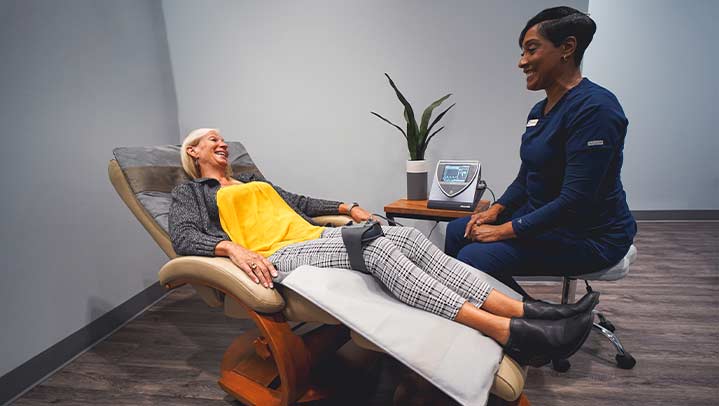
Request More Information:
Who can PEMF Help?
Pulsed Electromagnetic Field Therapy has been shown to improve many issues including back pain, arthritis, athletic performance, and sleep. PEMF as a therapy has been shown to help bone fractures heal, improve blood pressure and vascular function in patients with high blood pressure, and improve learning and memory in animal studies. The effects will vary from person to person depending on lifestyle and medical/health conditions.
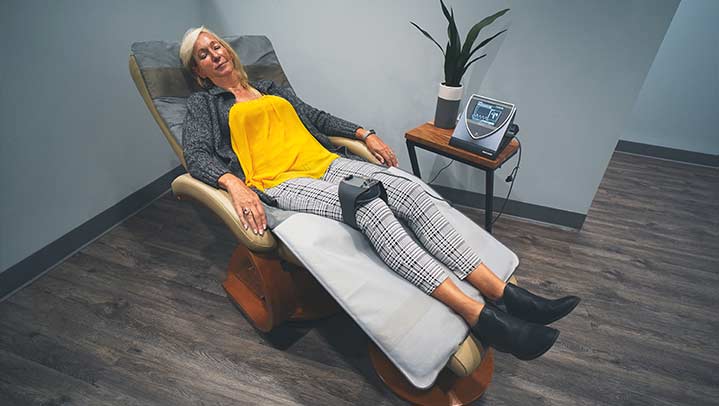
How Does PEMF Work?
The safe, noninvasive device works within certain signal ranges which were developed to improve tissue microcirculation(1). The signal pattern initiates something called vasomotion, which is similar to blood vessel relaxation-contraction activity that occurs in the micro vessels(1). This increases blood flow in your smaller arteries, facilitates blood flow in your tissues, and supplies oxygen to tissue regions that were receiving little to no oxygen. The changes in microcirculatory effects have been demonstrated via microscopy and spectroscopy(3).
What are the Benefits of PEMF?
When our body’s cells, tissues and organs are adequately nourished and metabolic waste products are removed, our bodies are healthier and function properly.
- Improves oxygen delivery
- Improves nutrient delivery
- Detoxifies the body
- Reduces pain
- Reduces fatigue
How to Prepare for your PEMF Session
Drink plenty of water pre and post treatment. Avoid caffeinated beverages prior to your session. Each session can last from 8-20 minutes. Patients sit or lie (fully clothed) on a PEMF mat which delivers general full body treatment. Sometimes, other accessories are applied in addition for targeted, deep treatment (for example, on an injured knee or joint pain). We do not allow cell phone use during your session as this could interfere with the frequencies from the PEMF mat.
For some people, increased oxygenation to tissues causes toxins to be moved out of the cells. This can result in mild side effects such as headaches, nausea, muscle aches, and fatigue. However, these are temporary. We encourage you to drink plenty of water, take Epsom salt baths etc. to promote removal of toxins from the body.
Contraindications include organ transplants, internal pacemakers/defibrillators, and pregnancy. Discuss with our provider before use.
Frequently Asked Questions About PEMF
What is PEMF therapy?
What does PEMF do?
Can PEMF cure diseases?
No, PEMF does not cure diseases. Through its mode of operation on microcirculation and subsequent improved maintenance of somatic cells, cells can perform the functions they were intended to do. In this way the body helps itself and expedite the healing process.
Is PEMF therapy safe?
What does PEMF therapy feel like?
Perception of PEMF application differs from user to user. Some users experience a light feeling of warmth or a tingle. Most feel clearly relaxed and invigorated after the application
When might I first noticeably feel a difference in energy?
Are there any side effects?
Are there any contraindications with PEMF?
Can PEMF be safely used in conjunction with blood thinning medications such as marcumar or warfarin?
Should you begin using PEMF whilst being treated with the aforementioned blood thinning medications, we recommend that you inform the doctor, and in the first six weeks of use continuously monitor the INR level that they have prescribed (once per week).
How long do I have to use PEMF to see results?
How long do therapy results remain?
Recent PEMF Therapy News & Research
HOW PEMF THERAPY IMPROVES SYMPTOMS OF RAYNAUD’S PHENOMENON
Extivita-RTP highly recommends our BEMER/PEMF Therapy to help ease the symptoms of Raynaud's Disease (also known as Raynaud's or Raynaud's phenomenon or syndrome). When you suffer from Raynaud's Disease, the blood vessels in the toes and fingers...
Raynaud’s Awareness Month Is October
Extivita-RTP recommends Hyperbaric Oxygen Therapy & PEMF/BEMER Therapy to aid in the relief of Raynaud's. REDDING, Conn., Sept. 28, 2021 /PRNewswire/ -- Raynaud's phenomenon is one of the most common medical disorders —more prevalent than...
Effects of Pulsed Electromagnetic Field Therapy on Pain, Stiffness, Physical Function
Pulsed electromagnetic field (PEMF) therapy is a potentially useful treatment for osteoarthritis (OA), but its effectiveness is still controversial. This study aimed to examine the effects of PEMF therapy and PEMF parameters on symptoms and quality of life (QOL).
References:
- Gyulai, Franciska et al. “BEMER Therapy Combined with Physiotherapy in Patients with Musculoskeletal Diseases: A Randomised, Controlled Double Blind Follow-Up Pilot Study.” Evidence-based complementary and alternative medicine : eCAM vol. 2015 (2015): 245742. doi:10.1155/2015/245742
- Klopp, Rainer Christian et al. “Effects of various physical treatment methods on arteriolar vasomotion and microhemodynamic functional characteristics in case of deficient regulation of organ blood flow. Results of a placebo-controlled, double-blind study.” Journal of complementary & integrative medicine vol. 10,Suppl (2013): S39-46, S41-9. doi:10.1515/jcim-2013-0035

